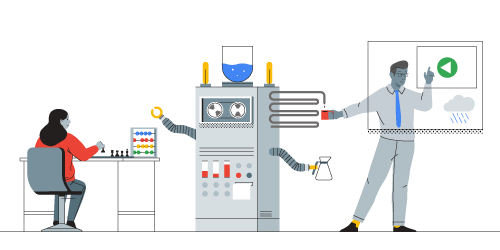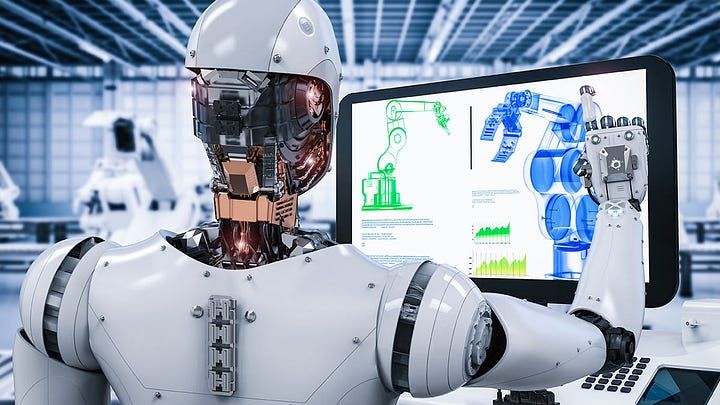Machine learning: transforming industries or transforming the future?

Machine learning is all over the business environment. Being a subset of AI, or artificial intelligence, this technology has quickly taken over the world’s biggest industries and remains one of the hottest technological trends.
ML brings industries incredible competitive advantages and makes the processes more accurate and personalized. No wonder every other company is considering the implementation of ML into its processes.
But where did it all start and where will it eventually lead us in the future? Let’s get back to basics and have a look at the evolution of machine learning.

The brief history of machine learning
If we address TechTarget for a definition, we’ll learn that “Machine learning (ML) is a category of algorithms that allows software applications to become more accurate in predicting outcomes without being explicitly programmed”.
In simple words, machine learning enables software (aka machines) to learn independently, based on the historical data and identified patterns and correlations. As a result, a machine becomes able to draw precise predictions and provides analysis for the future.
When Alan Turing came up with the famous “Turing Test” in 1950, he might not have suspected that one day, machines indeed will outsmart people in all that relates to the overwhelming amount of data and numbers.
We may skip the 1950–1990 and jump straight to the late 90-ies when IBM’s Deep Blue beats the world’s champion in a chess tournament (1997). From then on, machine learning took a full swing.
In 2011, Google came up with a Google Brain: a neural network that is able to categorize objects on the same level as the cat does.
In 2014, Facebook developed its famous face recognition algorithm and in 2015, Microsoft released the Distributed Machine Learning Toolkit.
Since then, the world’s biggest software companies like Google, Microsoft, and Amazon have been investing in machine learning research and development. From beating a man in a chess game to thorough financial analysis, machine learning has grown significantly and became a powerful asset to any data-driven company.

Machine learning today: the most popular applications
The unique feature of ML is its ability to process and analyze massive datasets. Based on that, the machine can further perform different actions, depending on the industry where it is applied.
Predictive analytics
This one is especially important for financial and healthcare companies.
Due to the ML ability to learn on big data sets, the technology can draw accurate predictions based on the historical data. These predictions turn out to be more precise and reliable than the ones made by people.
One of the most common examples is the use of ML in credit lending, where machine assesses whether the borrower should be granted credit or not.
In healthcare, ML can contribute to the prediction of a disease or its progression and thus, help save people’s lives.
As for app development, predictive analytics can help forecast future users’ behavior and help marketers adjust their strategy correspondingly.
Image recognition
We all know a feature of image recognition. It is present even in our smartphones when the iPhone creates a photo album with the same person.
But the feature of image recognition does not end on Facebook only. Object recognition, overall, is used in the surveillance, huge variety of apps (i.e. dating or editing), user authentication, and so on.
In addition to its entertaining function, image recognition has become an additional security asset that many companies can adopt.
Chatbots
Chatbots have advanced with time and now they are considered an integral part of any website that offers customer services.
Smart chatbots are incredibly valuable. They help users navigate the site, solve certain issues within mere seconds, and immediately receive the information. This, in turn, contributes to the customer experience greatly and boosts the user’s loyalty towards the company.
In e-commerce, chatbots can receive and process orders, give information on the order status, put items in the cart. Such process automation speeds up the overall company’s performance and leads to the inevitable revenue increase.
ML in the future: what should we expect?

Seems as if machine learning is already too advanced and cannot develop any further, but that’s not true. Below you will see the most expected trends for the ML development.
Visual and voice search in e-commerce
Though being only the predictions yet, but voice and image search in e-commerce is expected to become a big deal.
Pinterest, for example, has already launched their “Pinterest Lens” feature that allows scanning the item via a mobile device camera and finding similar images on Pinterest. Called a “Shazam for objects”, this technology takes online commerce to the brand new level and serves as an outstanding competitive advantage.
Since modern users do not want to spend their time browsing the Internet in search of an item, they’d gladly opt for an immediate item search via the object scanning.
As for voice shopping, Amazon already tried to popularize it with their Alexa Shopping experience. Though not seeing a lot of engagements yet, voice shopping is also predicted to become widespread among online shoppers.
Virtual assistants
Siri, Cortana, Alexa — all of them are the worldwide popular virtual assistants that make our life easier by performing voice-driven tasks.
Such assistants analyze the data and later on, adjust to your personal preferences. For example, Siri can display a certain “character”, based on its interaction with the owner.
Now virtual assistants evolved into something more serious. An example is the trending voice shopping in e-commerce that is predicted to become the next big thing.
The gradual transformation of the finance industry
The financial industry does not like changes if it’s something on the deep level.
In lending, specialists have relied on linear regression for decades. Now, all of a sudden, there is machine learning with better and faster results.
Though many financial specialists hesitate to implement the ML technology into the processes as it remains a complex “black box”, no one can deny the truth: ML proves to be an effective asset for many financial operations.
As for customer services, many companies already provide virtual assistants that help with minor processes like financial transactions. In the future, such helpers will become more common and reliable.
A new era for mobile development

There are millions of smartphone users in the world — and now it’s time for the brand-new customer experience.
Machine learning technology brings the following benefits in mobile development:
- Advanced personalization;
- Expanded range of services;
- Better and more efficient performance.
From fun apps like Snapchats to personal medical assistants, mobile development now undergoes a massive transformation. Machine learning can shape almost any mobile application and bring it to a new level.
With such a game-changer at their disposal, app development companies should consider what their next step will be and how machine learning can help them benefit in the best way possible.